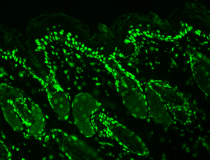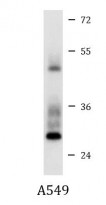ARG20521
anti-Acetylated Lysine antibody [7F8]
anti-Acetylated Lysine antibody [7F8] for ELISA,ICC/IF,IHC-Formalin-fixed paraffin-embedded sections,Immunoprecipitation,Western blot and Other
Gene Regulation antibody
Overview
| Product Description | Mouse Monoclonal antibody [7F8] recognizes Acetylated Lysine |
|---|---|
| Tested Reactivity | Other |
| Tested Application | ELISA, ICC/IF, IHC-P, IP, WB |
| Specificity | Detects proteins containing acetylated lysine residues. Does not detect non-acetylated lysine residues. |
| Host | Mouse |
| Clonality | Monoclonal |
| Clone | 7F8 |
| Isotype | IgG1 |
| Target Name | Acetylated Lysine |
| Immunogen | Acetylated KLH |
| Conjugation | Un-conjugated |
Application Instructions
| Cross Reactivity Note | Species Independent. Bovine albumin and Avian histones have been tested. | ||||||||||||
|---|---|---|---|---|---|---|---|---|---|---|---|---|---|
| Application Suggestion |
|
||||||||||||
| Application Note | * The dilutions indicate recommended starting dilutions and the optimal dilutions or concentrations should be determined by the scientist. |
Properties
| Form | Liquid |
|---|---|
| Purification | Purification with Protein G. |
| Buffer | PBS (pH 7.4), 0.09% Sodium azide and 50% Glycerol |
| Preservative | 0.09% Sodium azide |
| Stabilizer | 50% Glycerol |
| Concentration | 1 mg/ml |
| Storage Instruction | For continuous use, store undiluted antibody at 2-8°C for up to a week. For long-term storage, aliquot and store at -20°C. Storage in frost free freezers is not recommended. Avoid repeated freeze/thaw cycles. Suggest spin the vial prior to opening. The antibody solution should be gently mixed before use. |
| Note | For laboratory research only, not for drug, diagnostic or other use. |
Bioinformation
| Background | Post-translational modifications of proteins play critical roles in the regulation and function of many known biological processes. Proteins can be post-translationally modified in many different ways, and a common posttranscriptional modification of Lysine involves acetylation (1). The conserved amino-terminal domains of the four core histones (H2A, H2B, H3 and H4) contain lysines that are acetylated by histone acetyltransferases (HATs) and deacetylated by histone deacetylases (HDACs) (2). Protein posttranslational reversible lysine N ε - acetylation and deacetylation have been recognized as an emerging intracellular signaling mechanism that plays critical roles in regulating gene transcription, cell-cycle progression, apoptosis, DNA repair, and cytoskeletal organization (3). The regulation of protein acetylation status is impaired in the pathologies of cancer and polyglutamine diseases (4), and HDACs have become promising targets for anticancer drugs currently in development (5). 1. Yang XJ. (2005). Oncogene. 24:1653-1662. 2. Hassig, C.A. and Schreiber, S.L. (1997). Curr. Opin. Chem. Biol. 1(3): 300-308. 3. Yang XJ. (2004). Bioessays 26:1076-1087. 4. Hughes, R.E. (2002). Curr. Biol. 12: R141-R143. 5. Vigushin, D.M. and Coombes, R.C. (2004). Curr. Cancer Drug Targets 4: 205-218. |
|---|---|
| Research Area | Gene Regulation antibody |
Images (3) Click the Picture to Zoom In
-
ARG20521 anti-Acetylated Lysine antibody [7F8] IHC-P image
Immunohistochemistry: Bouin's fixed and paraffin-embedded Mouse backskin stained with ARG20521 anti-Acetylated Lysine antibody [7F8] at 1:100 for 1 hour at RT. Secondary Antibody: FITC Goat anti-Mouse (green) at 1:50 for 1 hour at RT.
-
ARG20521 anti-Acetylated Lysine antibody [7F8] WB image
Western blot: A549 cell lysate stained with ARG20521 anti-Acetylated Lysine antibody [7F8] at 1:200 dilution.
-
ARG20521 anti-Acetylated Lysine antibody [7F8] WB image
Western blot: Acetylated lysine in 1) 75 ng of Acetylated BSA, 2) Non-acetylated BSA, and 3) Marker. The blots were stained with ARG20521 anti-Acetylated Lysine antibody [7F8] at 1:1000 dilution.








